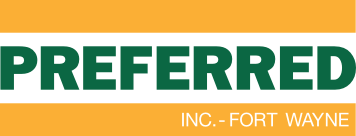Selecting the Right Flooring Type for Your Facility
Preferred can install a number of different flooring types depending upon your operational needs. Common flooring options include:
- Polished Concrete Floors: If day-to-day activity at your site consists of heavy foot and equipment traffic but chemical spills of any kind are unlikely to occur (such as at a typical warehouse or big box store), then a polished concrete floor would be an excellent choice.
Concrete polishing is a mechanical process in which abrasion (via a diamond grinder) is used first to grind concrete floors flat and then polish them to a desired sheen. The resulting surface is shiny, water-resistant, and easily cleanable.
Polished concrete floors are easy to clean due to their non-porous nature and are also low maintenance as there is no surface coating that can chip, wear, or deteriorate. As an additional benefit, concrete polishing can be accomplished fairly quickly with most jobs wrapping up within three days depending upon the size of the facility.
- Cementitious Urethane Mortar: Cementitious Urethane Mortar floors are typically utilized in food and beverage facilities where acidic spills, sanitizing chemicals, or hot water washing might occur. This 1/4-inch urethane cement floor covering is very resistant to corrosion, staining, and thermal shock.
- Electrostatic Dissipative (ESD) Floor: If your employees regularly handle sensitive electronic equipment, you may want to consider the installation of an electrostatic dissipative floor covering. This type of covering is impregnated with conductive fibers that ground employees and equipment to the concrete subflooring, preventing the accumulation of electrostatic charges that can damage or ruin sensitive and costly electronics.
- Epoxy Overlayment Flooring: Floors that are badly gouged or uneven may benefit from the installation of epoxy overlayment flooring. The installation of this 1/4″ thick flooring system involves the application of a blend of epoxy and quartz that is first troweled onto the surface to fill gouges and uneven areas and then compacted flat. Once cured, epoxy overlayment flooring is four times harder than cement, making it the perfect system for high-impact, high-traffic activity.
- Thin Film Epoxy/Urethane Coatings: Project managers in search of a chemical-resistant and impact-resistant flooring system should consider thin film epoxy and urethane flooring. This system incorporates the best of both worlds (epoxy and polyurethane) with two coats of 8-10mm thick epoxy followed by a 3-5mm thick coat of urethane. The result of this process is a floor that offers the chemical and impact resistance of epoxy and the discoloration resistance of polyurethane.
- Aisle and Walkway Floor Markings: A project manager should consider if floor markings should be added as part of a floor covering installation. Floor markings can improve operational safety by clearly designating pedestrian and equipment travel lanes and can improve organization and tidiness by designating how and where items and equipment should be stored.

